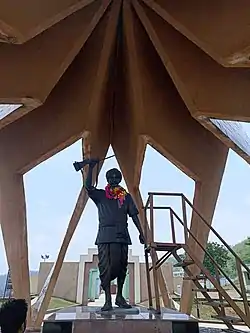Kumuram Bheem Tribal Museum
Kumuram Bheem Tribal Museum is a museum at Jodeghat village of Kerameri mandal at Komaram bheem Asifabad district. The Jodeghat Museum, also known as the Asifabad Museum, is one of the most important cultural sites in the Asifabad and adjacent areas.[1][2]
 Kumuram Bheem Statue at Jodeghat Tribal Museum | |
| Established | 2016 |
|---|---|
| Location | Kerameri, Asifabad district, Telangana |
| Coordinates | 19.36779°N 79.16104°E |
| Collection size | Tribal Aritifacts |
| Owner | Government of Telangana |
The museum stands out as one of the most historically significant locations in terms of Asifabad's tribal culture and Heritage. On September 1, 1940, Adivasi fighter Kumuram Bheem and his companions were martyred at Jodeghat, and the location developed a reputation for bravery and courage.
Kumuram Bheem, the popular tribal revolutionary, fought for Adivasi rights and was known for his thoughts on Jal (water), Jungle (forest) and Zameen (land).
History
The museum was launched on October 16, 2016, by Chief Minister Kalvakuntla Chandra Shekhar Rao, in honour of tribal chiefs who bravely fought for Jal (water), Jungle (forest), and Zameen (land).[3]
Kumuram Bheem was a tribal leader who rose up against Nizam police brutality in order to protect Adivasi rights and forest areas. Because the steep location has good defence facilities, Bheem has picked Jodeghat as the focal point for combating police forces. Tribal people were disturbed by Bheem's quest for sovereignty over Jal, the jungle, and Zameen. The news quickly travelled to 12 newly constructed hamlets in Asifabad district's Kerameri Mandal.[4][5] He used guerrilla warfare method for fighting against the Nizams.
On September 10, 1940, Bheem held his last meet at Avval pen of Jodeghat, and Nizam's men assaulted him. Kumuram Bheem and several of his followers were murdered in the fight.[6]
Attractions
Telangana's government has recognised the importance and built a museum in honour of tribal warrior Kumuram Bheem. Later, a grant of 25 crores was approved for the museum's construction and development as a hub for tribal traditions in the Asifabad area.[7]
The museum houses a collection of tribal relics, primarily from the Gonds, Kollams, Thotis, Andhs, and Pradhans. The museum also features sculptures depicting tribal customs and events. The museum stands as a hub representing tribal culture and it also has statues of Tribal Gods.[8]
Gallery
 Shirral diety of Andh Tribe
Shirral diety of Andh Tribe Persapen Goddess
Persapen Goddess Avvana Dolera
Avvana Dolera Kumuram Bheem statue at Museum
Kumuram Bheem statue at Museum Kumuram Bheem Tribal museum entrance
Kumuram Bheem Tribal museum entrance Haimendorf gallery
Haimendorf gallery
References
- "Jodeghat".
- "Jodeghat village on development path in Asifabad". 30 October 2020.
- Today, Telangana (2021-10-20). "Thousands pay homage to tribal legend Kumram Bheem". Telangana Today. Retrieved 2022-06-20.
- Komaram Bheem Museum In Jodeghat Village || Adilabad | hmtv Telugu News, retrieved 2022-06-20
- Jodeghat | Komaram Bheem's Birth Village | Loosing It's [sic] Charm Due to Lack of Basic Amenities, retrieved 2022-06-20
- "Jodeghat Museum: జోడెన్ఘాట్ వీరభూమి". Sakshi (in Telugu). 2021-03-29. Retrieved 2022-06-20.
- "Rs 25 crore granted for Jodeghat". 10 October 2014.
- Singh, S. Harpal (23 February 2020). "Jodeghat Museum closed for over a month". The Hindu.